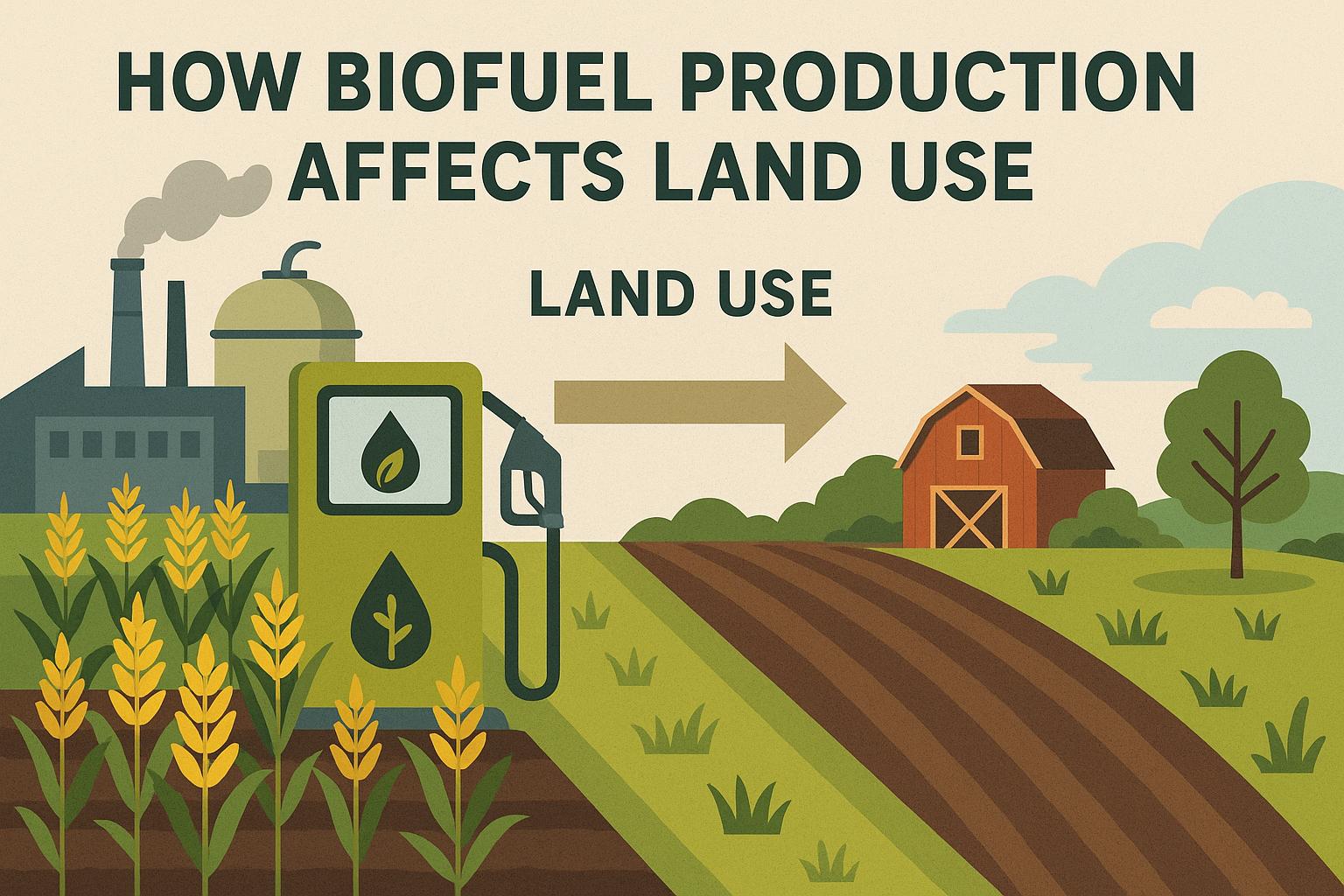Introduction to Biofuel Production
The production of biofuels has garnered significant attention as a potential alternative to fossil fuels. Derived from organic material, biofuels offer a renewable energy source that could reduce greenhouse gas emissions. However, the expansion of biofuel production has raised concerns about its impact on land use. This article examines how biofuel production affects land use and the associated implications.
Land Use Change and Biofuel Production
Biofuel production often requires large expanses of land, which can lead to changes in how this land is used. The cultivation of biofuel crops, such as corn, sugarcane, and soybeans, can displace land previously used for other agricultural purposes or natural habitats. This phenomenon, known as indirect land use change, can have significant environmental consequences.
Environmental Implications
The conversion of forests, grasslands, and wetlands into biofuel crop plantations can result in the loss of biodiversity. These ecosystems serve as habitats for a variety of species, and their alteration can threaten the survival of many organisms. Furthermore, the process of converting natural landscapes into agricultural land can lead to increased carbon emissions, as stored carbon in vegetation and soil is released into the atmosphere.
Impact on Food Production
Biofuel production competes with food production for land resources. When crops traditionally used for food are redirected for biofuel production, it can lead to food scarcity and increased prices. This potential conflict, often referred to as the food versus fuel debate, has significant social implications, particularly affecting low-income populations who may experience reduced access to affordable food.
Sustainable Practices and Future Considerations
To mitigate the negative impacts of biofuel production on land use, attention must be directed towards sustainable practices. Integrating advanced technologies, such as algae-based biofuels, can lessen the reliance on arable land. Additionally, policies that encourage the use of non-food crops and waste materials for biofuel production can help balance the demands on land resources.
Learn more about global environmental initiatives that address these challenges. These efforts are essential in ensuring that the expansion of biofuel production does not compromise ecological stability and food security.
Understanding Biofuel Production: A Deeper Insight
Biofuels have emerged as a crucial component in the global quest for sustainable energy sources. As fossil fuel reserves dwindle and environmental concerns mount, the transition to renewable energy forms like biofuels becomes increasingly important. Various organic materials, including plant matter, agricultural residues, and even waste products, can be converted into biofuels, providing a versatile approach to energy production.
The Mechanisms of Biofuel Production
Biofuel production involves several techniques, the most common being fermentation and transesterification. Fermentation is used primarily for producing bioethanol, where sugars from crops like corn and sugarcane are converted by microorganisms into alcohol. Transesterification, on the other hand, is used to create biodiesel by reacting vegetable oils or animal fats with alcohol, typically methanol.
Understanding these processes is critical, as each has unique requirements concerning the type and amount of land needed. While bioethanol production relies heavily on arable farming land, biodiesel can be derived from less fertile regions, especially when produced from waste oils.
Integrating Sustainable Practices
Sustainable biofuel production necessitates adopting practices that do not overstress existing resources. Crop rotation, agroforestry, and cover cropping can play vital roles in maintaining soil fertility and reducing the ecological footprint of biofuel crops. Technologies like precision agriculture can optimize the input and yields, contributing to more sustainable land use.
Furthermore, advancements in bioengineering may lead to developing crop varieties that require fewer inputs or are more suitable for marginal lands, thus reducing competition with food production.
The Role of Governmental Policies
Policy frameworks significantly influence the trajectory of biofuel production. Governments can implement subsidies, tax incentives, and mandates that encourage the production and use of biofuels. However, it is imperative these policies are crafted to encourage sustainability and social equity.
For instance, enforcing sustainability criteria, such as greenhouse gas reduction targets and biodiversity protection measures, can ensure that biofuel production transitions remain environmentally sound. Moreover, prioritizing research and development funding for second-generation biofuels, which do not compete directly with food crops, can further advance this objective.
Challenges and Opportunities in Biofuel Expansion
While biofuels offer significant benefits, several challenges could impede their widespread adoption. Land availability remains a pressing concern, especially in densely populated regions where agricultural land is scarce. Water usage for biofuel crops can also pose challenges in arid areas, where water resources are already under stress.
Conversely, the opportunities presented by biofuels are numerous. Innovations in biotechnology hold the promise of producing biofuels more efficiently and sustainably. The development of drop-in biofuels that are compatible with existing fuel infrastructure could facilitate a smoother transition from fossil fuels, reducing the need for extensive new infrastructure and contributing to energy security.
Conclusion: Balancing the Equation
The expansion of biofuels as a viable alternative to fossil fuels represents a complex equation in which environmental, economic, and social factors must be balanced. Successful integration of biofuels into the global energy mix demands a nuanced approach that considers land use, technological advancements, and policy frameworks.
While the challenges are significant, they are not insurmountable. By prioritizing research, fostering innovation, and implementing informed policies, the world can harness the potential of biofuels in a way that supports both human and environmental well-being.
As we move forward, a collaborative effort from scientists, policymakers, and communities will be essential. Together, these stakeholders can lead the charge toward a future where energy needs are met sustainably, and resources are managed responsibly, ensuring energy security without compromising ecological integrity.


